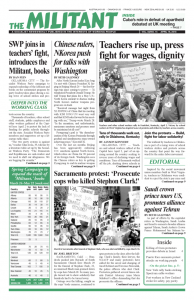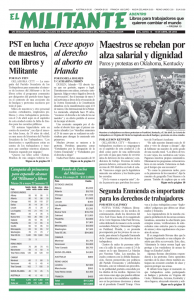Protest actions were held in Israel March 31 and April 1 against Israeli army attacks that killed at least 15 Palestinian demonstrators and wounded hundreds of Gaza Strip residents. They were marching on the border to challenge the Israeli blockade there March 30. Some 300 people protested in Tel Aviv. There were smaller actions in Yad Mordechai near Gaza and one in Jaffa led by Palestinian citizens of Israel.
Forces from Hamas, the Islamist ruling party in Gaza, set up five camps with tents, portable washrooms, offering free food and Wi-Fi, near the border with Israel as part of what they call the “March of Return.” The series of actions will last six weeks and culminate May 15, the 70th anniversary of Israel’s declaration of independence. Many Palestinians call it the Nakba, or catastrophe, the expulsion of hundreds of thousands of Palestinians from their land.
The Israeli government pulled out from Gaza in 2005, turning it over to Palestinian control. In June 2007 Hamas, which is backed by Tehran, wrested control of Gaza from Fatah in bloody street fighting.
Because of restrictions on imports of basic necessities imposed by the Israeli government — exacerbated by infighting between the Palestinian Authority in the West Bank and Hamas — Gaza residents are dependent on United Nations aid and at least 60 percent of its youth are unemployed.
Hamas deliberately organized the action to provoke Israeli authorities. Despite publicly claiming it would be a peaceful, nonviolent demonstration, members of Hamas’ military wing, the Izzadin Kassam Brigade, organized to attack the border fence. Israeli officials repeatedly warned demonstrators to not approach the fence, through social media, leaflets dropped from airplanes and statements to news media.
Haaretz reported the protest was three actions in one. “The large majority of the nearly 30,000 Palestinian protesters was groups of families” who stayed well away from the border, despite attempts by Hamas to get them to join their provocations; smaller groups that threw stones and rolled burning tires toward the fence; and individuals who physically tried to wreck, burn or blow up the fence, knowing full well that the Israeli government had warned that anyone who did so would be met by force.
Like during three previous wars in Gaza over the past decade, Hamas’ goal was to trigger Israeli military retaliation against Palestinians who were drawn to the protest so the reactionary group can use the deaths and injuries to gain a hearing from the imperialist powers. Their aim is to generate pressure on the rulers in Tel Aviv to make concessions.
Hamas admits that at least five of those killed — overwhelmingly while trying to breach the fence — were members of its armed brigade. Israeli authorities say 10 were, and that some shot at Israeli soldiers.
The Israel Defense Forces’ use of firepower and the resulting deaths and injuries have sparked a debate in Israel.
Well-known radio host Kobi Meidan posted on his Facebook page that he is “ashamed to be Israeli” because of the killings, and then was suspended by Army Radio April 2. Defense Minister Avigdor Lieberman called for his firing.
“I am firmly opposed to firings based on freedom of speech,” said Avi Gabbay, leader of the Zionist Union, the main capitalist opposition party, even though he said he disagrees with Meidan’s viewpoint.
Rachel Azaria, a Member of Parliament from the Kulanu Party, was one of the few members of Prime Minister Benjamin Netanyahu’s ruling coalition who defended the radio host. “It is important that the media, like anywhere else, have a range of opinions,” she said. “Stop censoring. You never know when it’ll reach you.”
Pointing to Hamas’ provocations, former Israeli soldier Lior Tal Sadeh wrote to the online Times of Israel to criticize those who suggest the Israeli soldiers “fired live bullets at Gazans who were simply protesting.”
“You acted in an incredibly irresponsible manner,” he said.
But he also criticized those who insisted “everything was Hamas’s fault and that there is nothing to investigate and this would teach them not to approach the fence.”
“You too acted irresponsibly,” he said.
Michael Sfard, an Israeli lawyer well-known for his defense of Palestinian rights, is one of those who joined the protest in Tel Aviv. The action was organized under the slogan, “Create hope, stop the next war.”
“Those approaching the border did not present any serious danger to life or limb. Damage to the fence would be the lesser evil,” Sfard told the Militant in a phone interview April 4. “Maybe Hamas should be held accountable for exploiting people. But that doesn’t diminish the responsibility of Israelis to speak out against the killings.”

